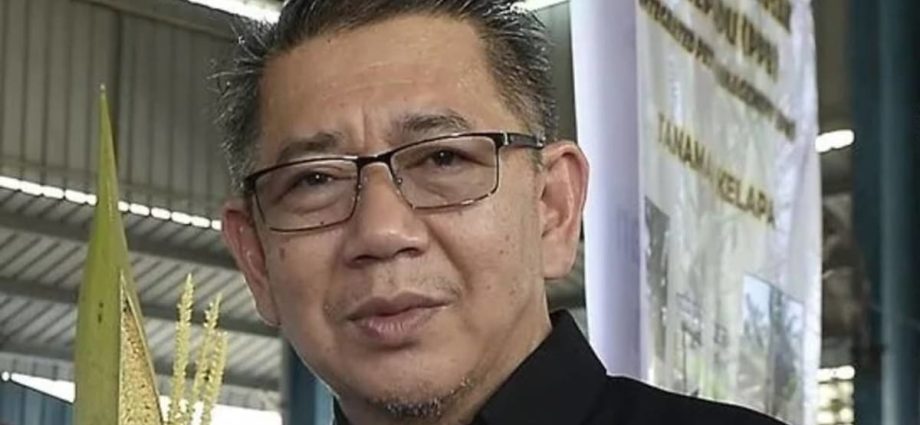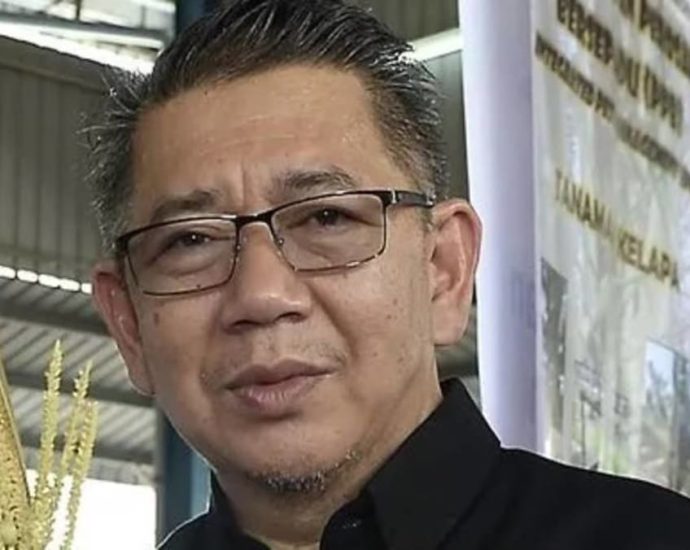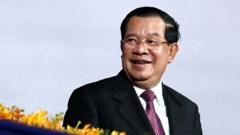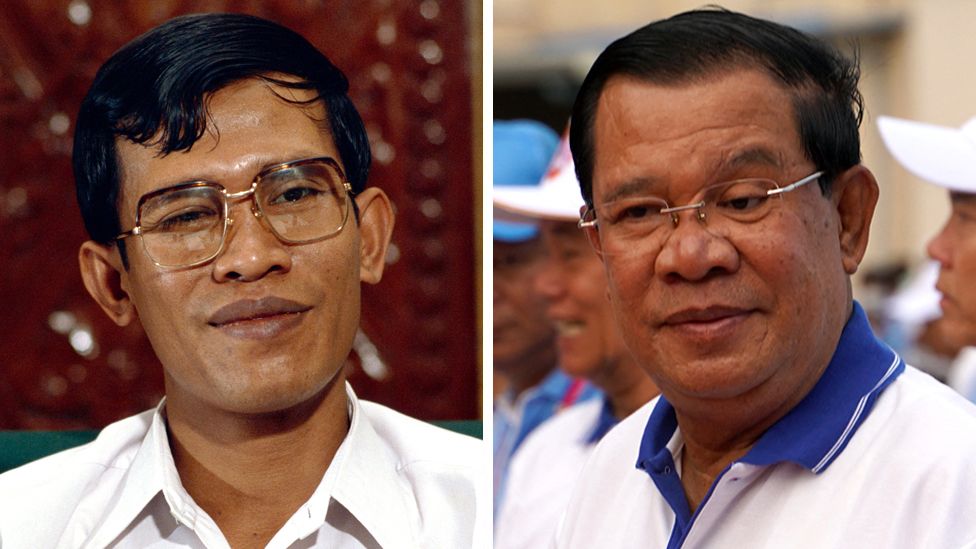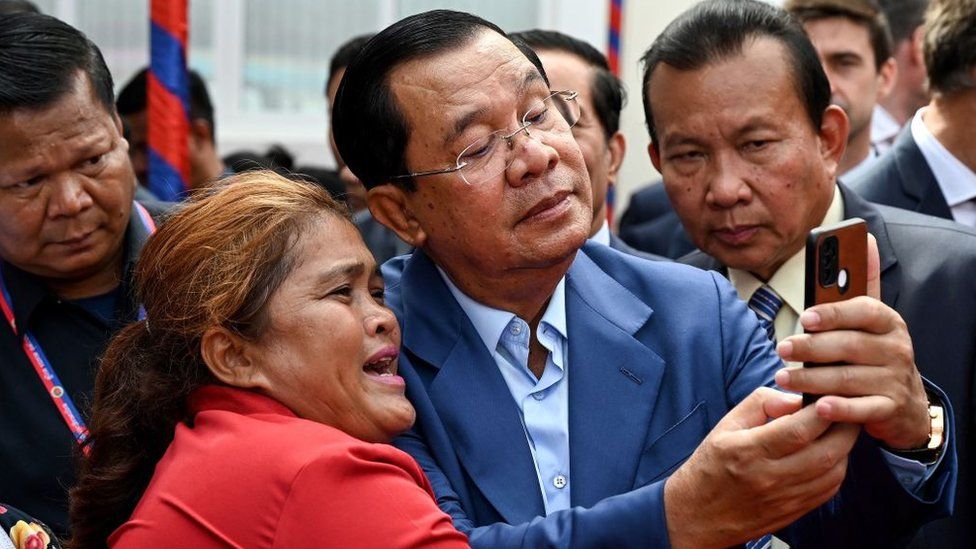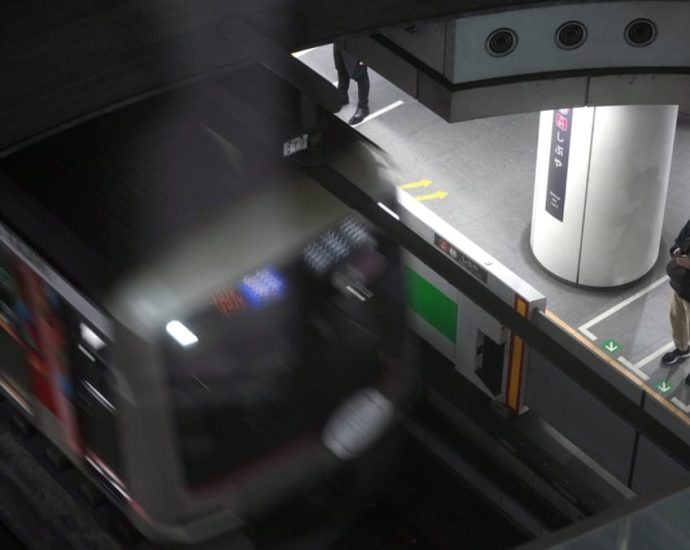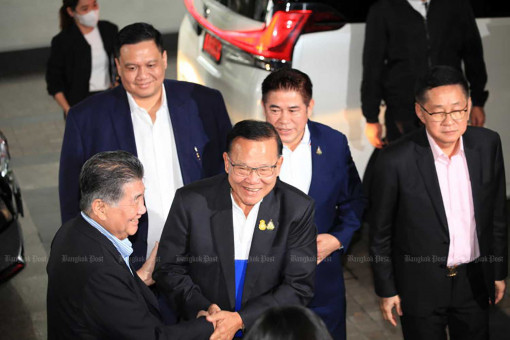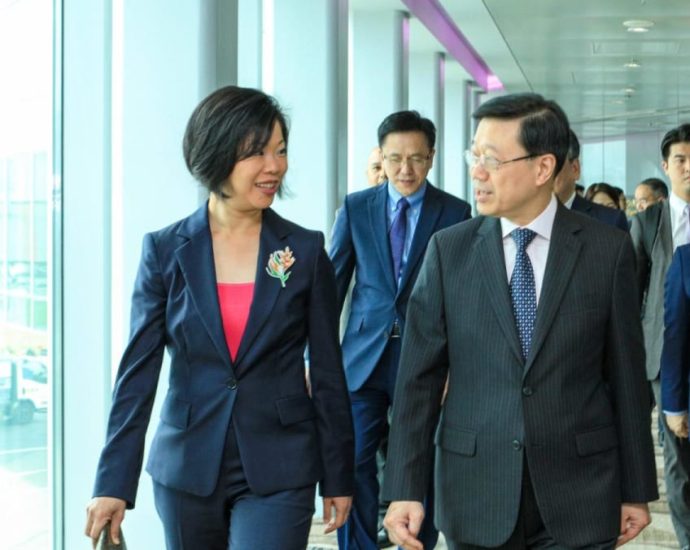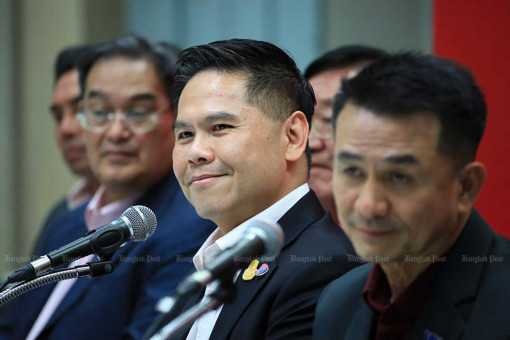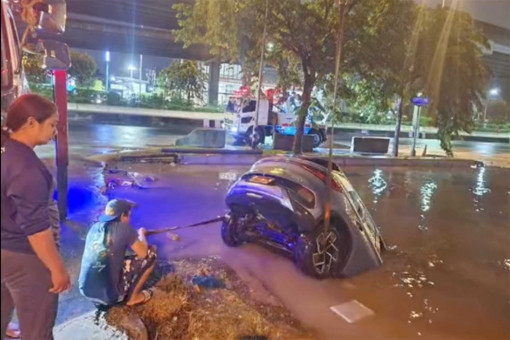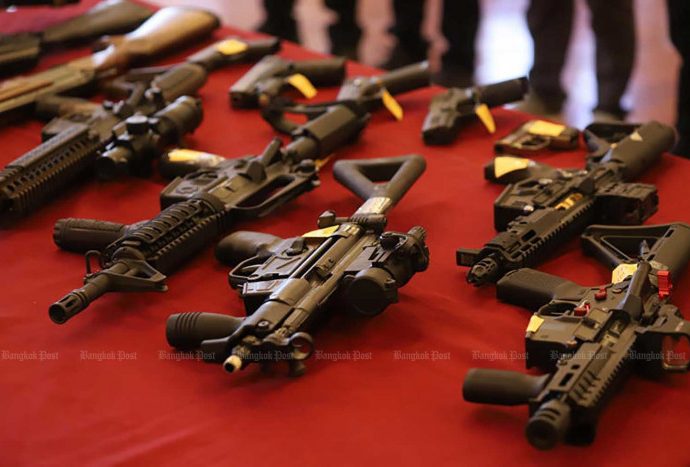Malaysia domestic trade minister Salahuddin Ayub, 61, dies after surgery
KUALA LUMPUR: Malaysia’s Domestic Trade and Cost of Living Minister Salahuddin Ayub died on Sunday (Jul 23) following surgery for a brain haemorrhage. He was 61. This was confirmed by his daughter Fatiha Salahuddin in a Facebook post. “We are saddened to inform that the head of our family, Salahuddin AyubContinue Reading
Malaysia domestic trade minister Salahuddin Ayub dies aged 61
KUALA LUMPUR: Malaysia’s Domestic Trade and Cost of Living Minister Salahuddin Ayub died on Sunday (Jul 23) following surgery for a brain haemorrhage. He was 61. This was confirmed by his daughter Fatiha Salahuddin in a Facebook post. “We are saddened to inform that the head of our family, Salahuddin AyubContinue Reading
Cambodia election: ‘This was more of a coronation than an election’
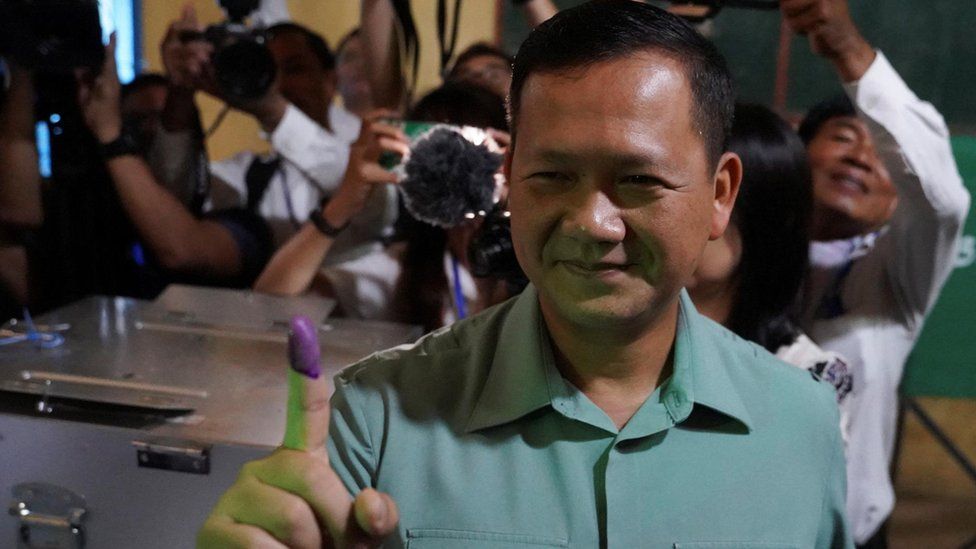 Reuters
ReutersUndeterred by the pouring rain, a long convoy of motorbikes carrying cheering, flag-waving supporters of Cambodia’s ruling party revved their engines in preparation for their triumphant final rally in downtown Phnom Penh.
People dutifully lined the road as far as you could see, party stickers on their cheeks, the sky-blue hats and shirts they had been given to wear getting steadily wetter.
Perched on the back of a truck, Hun Manet, the 45-year-old eldest son of Prime Minister Hun Sen, greeted the crowds proclaiming that only the Cambodian People’s Party (CPP) was capable of leading the country.
Indeed, his father had made sure that the CPP was the only party which could possibly win the election.
Hun Sen, 70, has run Cambodia in his trademark pugnacious style for 38 years: first in a Vietnam-installed communist regime, then under a UN-installed multi-party system, and more recently as an increasingly intolerant autocrat.
The only party now capable of challenging his rule, the Candlelight Party, was banned from the election on a technicality in May. The remaining 17 parties allowed to contest it were too small or too little-known to pose a threat.
A few hours after the polls closed, the CPP claimed the expected landslide, with a turnout of more than 80%. There were quite high levels of spoiled ballot papers in some polling stations: that was probably the only safe way voters could show their support for the opposition.
With Hun Manet expected to succeed his father within weeks of the vote, in a long-prepared transfer of power, this felt more like a coronation than an election.
“I don’t think we can even call it a sham election,” says Mu Sochua, an exiled former minister and member of the CNRP, another opposition party banned by the Cambodian authorities in 2017.
“We should call it a ‘selection’, for Hun Sen to make sure that his party will select his son as the next prime minister of Cambodia, to continue the dynasty of the Hun family.”
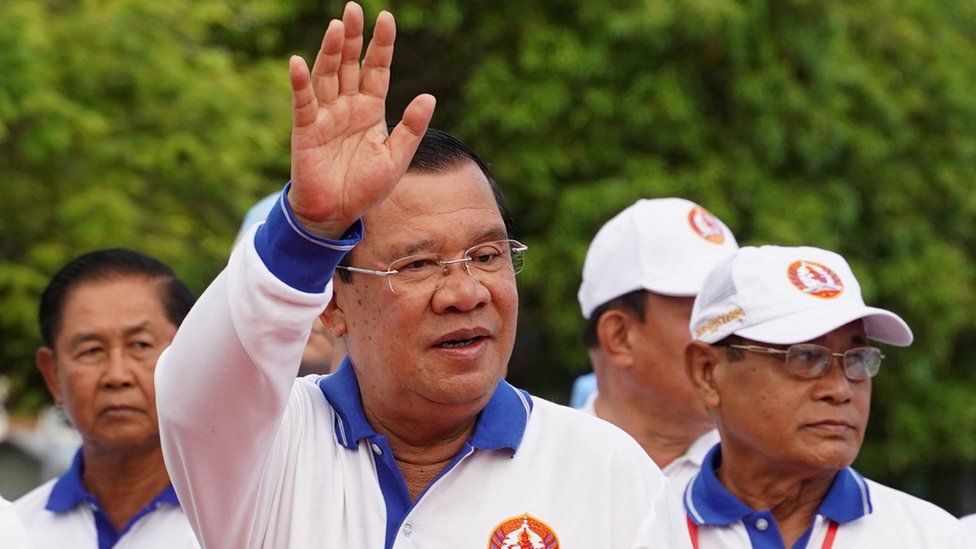
Yet there were signs of nervousness in the CPP before the vote. New laws were hurriedly passed criminalising any encouragement of ballot-spoiling or a boycott. Several Candlelight members were arrested.
“Why was the CPP campaigning so hard, against no one in this election with no real opposition?” asks Ou Virak, founder of the Cambodian think tank Future Forum.
“They knew they would win the election – that was an easy outcome for them. But winning legitimacy is much more difficult.
“They need to keep weakening the opposition, but at the same time, they also need to satisfy the people, so there is no repeat of previous setbacks and disruptions, like street protests.”
Hun Sen is one of Asia’s great survivors, a wily, street-smart politician who has time and again outmanoeuvred his opponents. He has skilfully played off China, by far the biggest foreign investor these days, against the US and Europe, which are trying to claw back lost influence in the region.
But he has come close to losing elections in the past. He is still vulnerable, to rival factions in his own ruling party, and to any sudden downturn in the Cambodian economy which could sour public opinion against him. So as he prepares for a once-in-a-generation leadership change, he is trying to cement his legacy.
A short drive north of the capital, a 33m-high concrete-and-marble monolith was built recently, which he calls the Win-Win memorial.
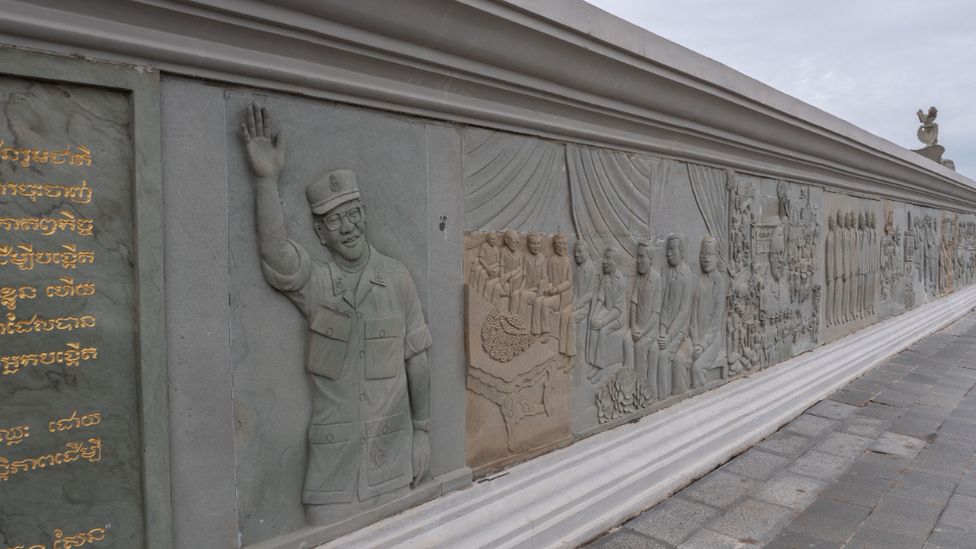
Its massive base is covered in carved stone reliefs, echoing Cambodia’s greatest historic monument, Angkor Wat.
They depict Hun Sen’s flight from Khmer Rouge-ruled Cambodia to Vietnam in 1977, his triumphant return with the invading Vietnamese army in 1979, and his eventual deal with the last of the Khmer Rouge leaders in 1998 that ended the long civil war – his win-win for the Cambodian people.
Delivering peace and prosperity has long been Hun Sen’s main claim to legitimacy. Since 1998, Cambodia has had one of the world’s fastest-growing economies, albeit from a very low base.
But it is a model of growth which has concentrated wealth in the hands of a few families – the number of ultra-luxury cars on the roads of such a low-income country is jarring. It has encouraged rapacious exploitation of Cambodia’s natural resources and it has left many ordinary people feeling that they are not winning under Mr Sen.
Prak Sopheap lives with her family at the back of an engine repair shop, squeezed between the main road and one of the many shallow lakes in the low-lying land outside Phnom Penh. They have been there for 25 years, fishing and cultivating vegetables on the lake.
Today, though, much of the lake has been filled with rubble by a property developer and Ms Sopheap’s family have been ordered to leave.
She showed me a document from the local council, confirming how long she had lived there, and another document, a summons to court on a charge of illegally occupying state land. She feels powerless and angry – and she is not alone.
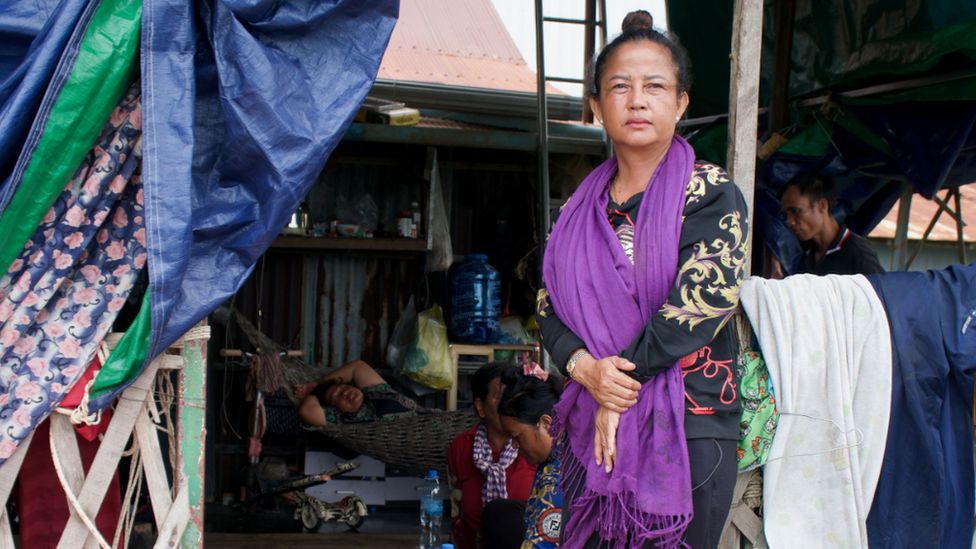
Land disputes are among the most incendiary grievances in Cambodia. All property deeds were destroyed in the Khmer Rouge revolution.
Since the end of the civil war, millions of hectares have been allocated for commercial development, a lucrative arrangement which has made many politicians and businesses allied to Hun Sen very rich.
The courts very rarely rule against these powerful interests. Transparency International ranks Cambodia as 150th out of 180 countries for corruption: in the Asia-Pacific region, only Myanmar and North Korea rank lower.
“Hun Sen always talks about his ‘win-win policy'”, says Ms Sopheap. “But we feel it is he alone who wins. We cannot feel at peace, as we now face eviction. We, the real Cambodian people, who live on this land, are suffering in the name of development.”
Those who have tried to campaign against land grabs and evictions have been harassed, beaten and jailed, as have trade unionists and supporters of opposition parties. I asked Ms Sopheap how she would vote in this election. “Who can I choose?” she asked. “Who can protect me?”
Half of those eligible to vote are under 35 years old. The CPP has tried attracting them by having Hun Manet and other younger party leaders run this year’s campaign, with a slick social media strategy.
But as most Cambodians have no memory of war or the Khmer Rouge, Ly Chandravuth, a 23-year-old law graduate and environmental activist, says the old CPP campaign points are no longer persuasive.
“Hun Manet’s biggest challenge will be that my generation is very different from previous ones, who were traumatised by the Khmer Rouge,” he says.
“Since I was a child, I have watched the ruling party reminding us of that tragedy, telling us that as they brought peace, we should support them. But that argument is less and less effective. Every time the ruling party brings it up, the young generation mocks them, because they have been repeating it for 30 years.”
Can Hun Manet modify the rough-house, sometimes thuggish leadership style of his father to a softer and more subtle kind of rule? Despite his Western education, his years heading the army and his long apprenticeship, he has never yet held a top political office.
With him, other “princeling” sons of Hun Sen’s contemporaries, such as Defence Minister Tea Banh and Interior Minister Sar Keng, are also expected to replace their fathers in the cabinet – a dynastic shift which keeps the levers of power with the same families, but in less experienced hands. The next few years could be a delicate, even dangerous time for Cambodia.

- GEO-GENIUS OR GEOGRAPHICALLY CHALLENGED?: Lose yourself in the deceivingly difficult location guessing test
- 10 BILLION A DAY: From a simple square grid to a staple of our communication, discover the story of the first emoji

-
-
22 hours ago
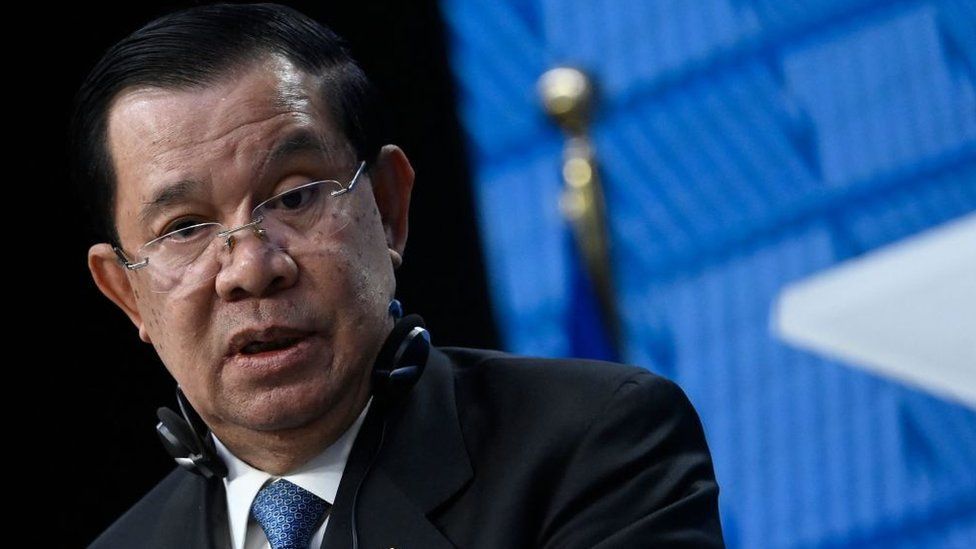
-
Three hurt in Japan train stabbing attack
TOKYO: Three people were hurt in a knife attack on a train in western Japan on Sunday (Jul 23), with police saying they had arrested a man for allegedly carrying out the stabbings. The victims – a train conductor in his 20s and two male passengers aged in their 20sContinue Reading
Pheu Thai: coalition including Move Forward unlikely to prevail
PUBLISHED : 23 Jul 2023 at 20:29
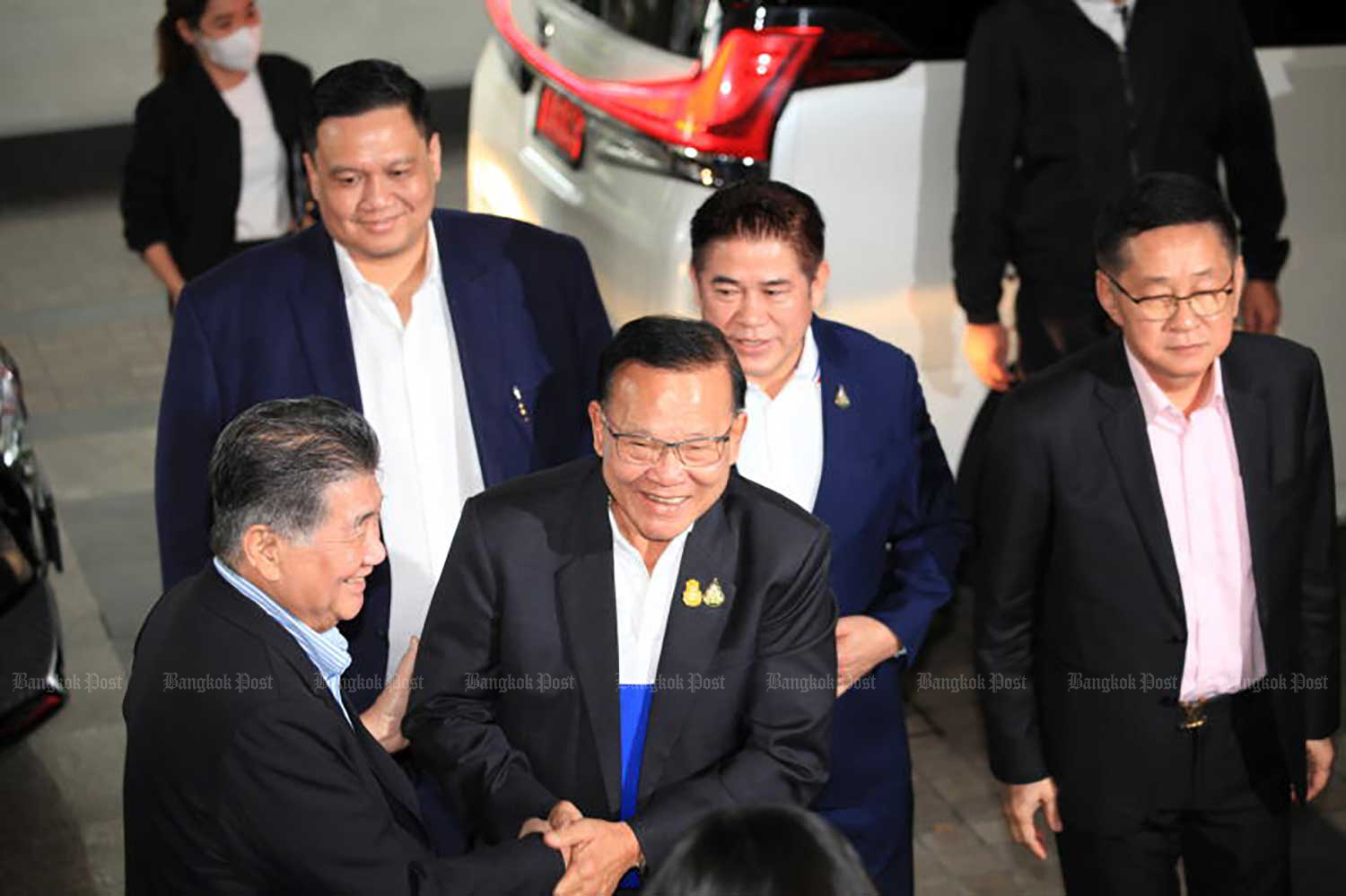
The Pheu Thai Party leader has said if the election-winning Move Forward Party (MFP) is part of its coalition alliance, it is unlikely to win enough parliamentary support to elect a prime minister and form the next government.
Pheu Thai leader Cholnan Srikaew said on Sunday that over the past two days Pheu Thai discussed the eight-party alliance’s government formation efforts with political parties outside its bloc and determined that the other parties will not support the effort if the alliance includes a party that plans to change the lese majeste law, Section 112 of the Criminal Code that punishes anyone deemed to have criticised senior members of the royal family with up to 15 years in prison.
Dr Cholnan was apparently referring to the MFP, the other main member of the eight-party alliance.
The eight-party alliance had a majority of 312 votes in the elected House, but needed at least 375 votes from both the House and the military-appointed Senate to have a prime minister installed and then a new government established. Of the joint sitting of both houses comprising 500 representatives and 249 senators, 375 will form a minimal majority vote.
Most senators already showed they did not support the MFP when its leader Pita Limjaroenrat failed to win a majority vote from a joint sitting to become prime minister on July 13 and again on July 19.
After meeting key figures of the Palang Pracharath Party (PPRP) on Sunday evening, Pheu Thai leader Cholnan Srikaew said PPRP was another political party that would not support the coalition if it included any party that planned to amend the lese majeste law.
“Most parties (that Pheu Thai met) are unlikely to vote in favour of the coalition alliance,” the Pheu Thai leader said. He denied that Pheu Thai was inviting any political party outside its eight-party bloc to join their coalition government.
Dr Cholnan admitted that if the coalition alliance still comprises the same old eight parties, other parties will not support the coalition in the parliament. He also confessed that the coaltion would need at least 375 votes from the House and the Senate.
On Monday Pheu Thai would discuss the matter with representatives of senators and on Tuesday it would report its findings to the seven other parties in its coalition alliance, Dr Cholnan said. He expected the eight coalition allies to reach a conclusion on Tuesday.
“We will have a joint announcement on the government formation. We have two days, July 25 and 26, and on July 27 (Thursday) it will be known who will be nominated (for prime minister) in the parliament,” Dr Cholnan said.
Hong Kong leader John Lee in Singapore as part of week-long ASEAN trip
SINGAPORE: Hong Kong Chief Executive John Lee is in Singapore, his first visit since becoming the territory’s new leader just over a year ago. His visit, from Sunday (Jul 23) to Tuesday, comes at the invitation of Prime Minister Lee Hsien Loong, said the Ministry of Foreign Affairs (MFA) on Sunday. MFA addedContinue Reading
Pheu Thai told again: kick Move Forward out of coalition
PUBLISHED : 23 Jul 2023 at 17:54
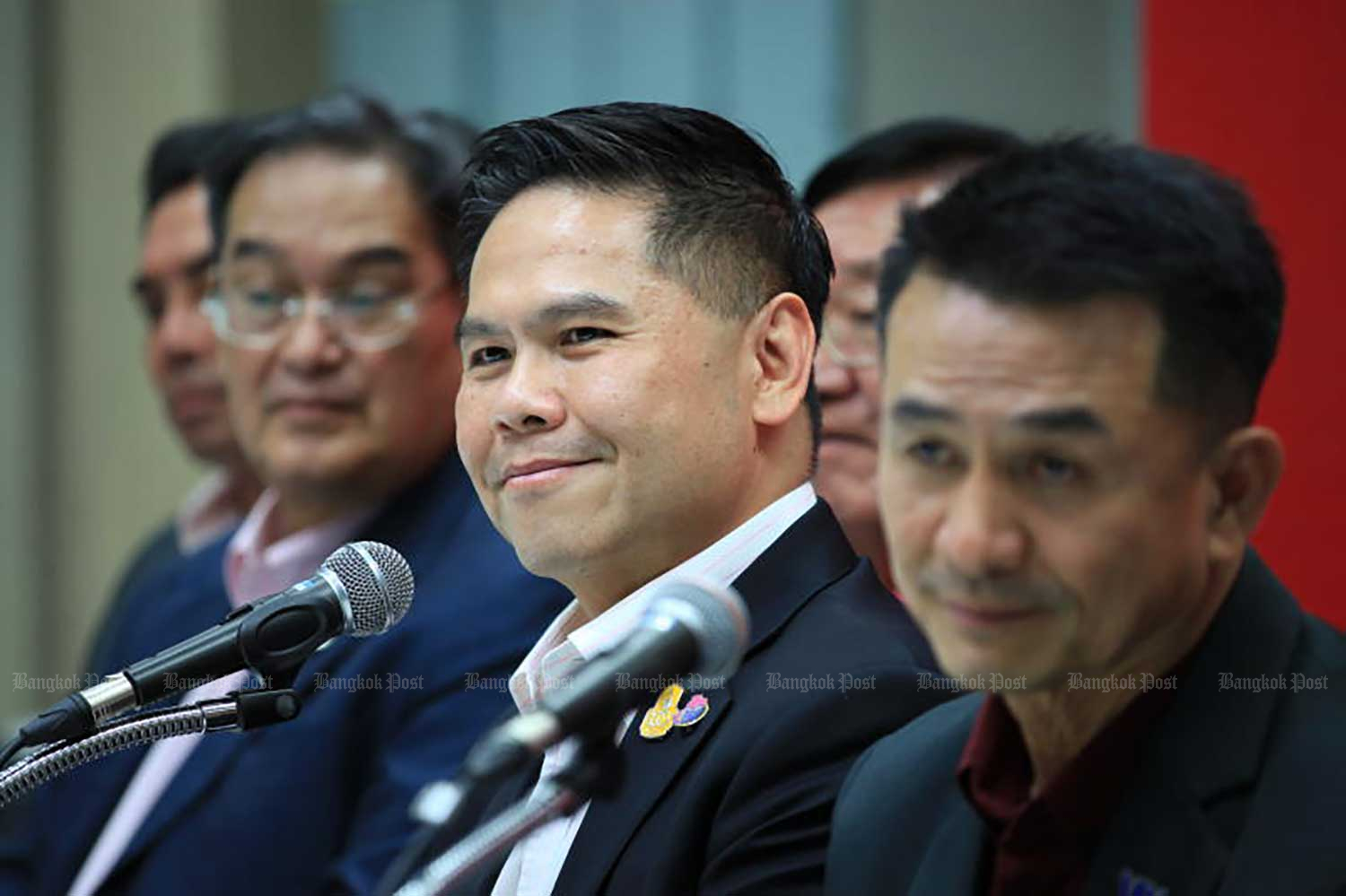
The leader of the Chartthaipattana Party on Sunday told the Pheu Thai Party (PTP) that is taking the lead in forming the next government that it will not vote for a prime ministerial candidate from Pheu Thai if its coalition includes a party that wants to change the lese majeste (royal insult) law.
Chartthaipattana Party leader Varawut Silpa-archa informed a press conference of his party’s standpoint after meeting key Pheu Thai figures at PTP headquarters on Sunday. He apparently referred to the election-winning Move Forward Party (MFP) which has stood firm on changing the lese majeste law or Section 112 of the Criminal Code.
The MFP won 151 House seats in the May 14 general election. It teamed up with Pheu Thai, which came second with 141 House seats, and six other parties to attempt the formation of the next government. Their coalition had 312 of the 500 House seats.
But Move Forward failed to win a majority vote from the elected House and the military-appointed Senate for the premiership of its sole prime ministerial candidate and leader Pita Limjaroenrat. MFP recently decided to let Pheu Thai nominate its prime ministerial candidate and take the lead in forming the next government.
Pheu Thai has discussed forming a government with parties outside its eight-party coalition alliance, meeting the Bhumjaithai, United Thai Nation and Chartpattanakla parties. Bhumjaithai and United Thai Nation insisted that they will not support Pheu Thai’s government formation if its coalition includes MFP.
Pheu Thai then proceeded to hold talks with Chartthaipattana, which holds 10 House seats, on Sunday.
After the meeting, Mr Varawut said his party would vote for a prime ministerial candidate from Pheu Thai as long as no party in its alliance intended to amend the lese majeste law.
“If any political party shares the same thinking with Chartthaipattana, to leave the (lese majeste) law intact and have positive attitudes and respect for the (royal) institution, then we can work together. If there is any political party with a different standpoint, we will work separately,” Mr Varawut said.
“If Pheu Thai has a similar direction with Chartthaipattana about the institution and Section 112 and if there is a prime ministerial candidate from Pheu Thai, we, Chartthaipattana, will be willing to give support. But Pheu Thai must not have any party with a different concept from ours,” Mr Varawut said.
On the same occasion, Pheu Thai leader Cholnan Srikaew said the eight-party coalition alliance assigned Pheu Thai to gather support for government formation with other political parties, and was seeking their opinions.
Dr Cholnan denied that Pheu Thai was inviting other parties outside its alliance to join its coalition and would exclude MFP from the alliance, sending the election-winning party to the opposition.
Probe after ‘no warning signs’ Bangkok ditch car plunge
PUBLISHED : 23 Jul 2023 at 16:54

An investigation is being conducted into an accident in which a car fell into a ditch while turning into Soi 28 off the Vibhavadi Rangsit highway in Bangkok on Friday.
Sawang Buranathanakit, director of the Road Construction Office 1 of the Highway Department, said that from an initial investigation the accident occurred on a road branching off Vibhavadi Rangsit (Highway 31) into Soi 28 where a roadside ditch was being dredged under a development project.
He said all contractors of the Highway Department’s development projects have been told to strictly take safety measures by putting up warning and traffic signs as well as placing barriers for motorists to be careful while passing areas under construction to prevent accidents.
The accident on Soi 28 off Vibhavadi Rangsit highway happened in heavy rain and the road surface was inundated. An investigation was being conducted to determine what caused the accident or whether there were any mistakes to prevent a recurrence of it, Mr Sawang said.
He said the Highway Department had told the project contractor to contact the owner of the car involved in the accident to compensate for the damage.
The accident was brought to public attention after the driver of the car posted on TikTok a video clip of the area after the accident.
He said there were no signs to tell motorists to be careful while passing an area under construction.
The man said he narrowly escaped death and felt very sad seeing his beloved new EV sink into the water before his eyes.
UK band The 1975 nix Indonesia, Taiwan gig after Malaysia LGBTQ uproar
“The 1975 regret to announce that their forthcoming shows in Jakarta and Taipei will no longer be going ahead as planned,” the band said in a statement Sunday on the We The Fest Instagram page. “The band never take the decision to cancel a show lightly and had been eagerlyContinue Reading
Illegal guns seized, suspects arrested in nationwide crackdown

PUBLISHED : 23 Jul 2023 at 15:52
Police have seized large quantities of illegal guns and ammunition and arrested 966 suspects in a month-long nationwide crackdown that began on July 1, deputy police chief Pol Gen Torsak Sukwimol said on Sunday.
As of July 21, the police had raided 1,658 targets nationwide, arrested 966 suspects, seized 911 illegal guns, 44,540 rounds of assorted ammunition, two explosives and 6,239 methamphetamine pills, he said.
In one of the raids, police from Khao Phanom district, Krabi province, laid siege to a house in tambon Na Khao which belonged to a suspect called Boom, 28, who was wanted under three warrants on drug and attempted murder charges.
The suspect fled on a motorcycle from the back of the house. When the police followed, he opened fire at them with a gun, Pol Gen Torsak said. The suspect was killed in an ensuing exchange of fire.
Found by his side were a 9mm Mauser pistol, one M67 hand grenade and two smoke grenades.
The operation targeting illegal weapons, gunmen for hire and the illegal weapon trades is being conducted from July 1-30 under the supervision of assistant police chief Pol Lt Gen Samran Nualma – with information from the Metropolitan Police Bureau, Provincial Police Regions 1-9, Central Investigation Bureau, Narcotic Suppression Bureau, Tourist Police Bureau, Immigration Police Bureau, Cyber Crime Investigation Bureau and Border Patrol Police.

